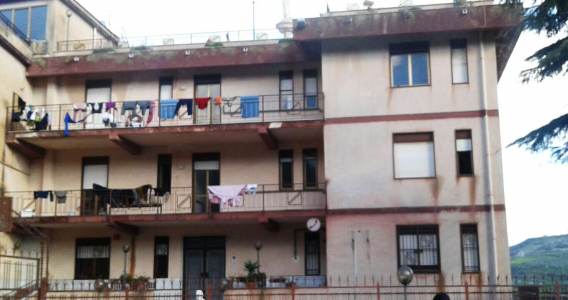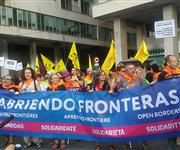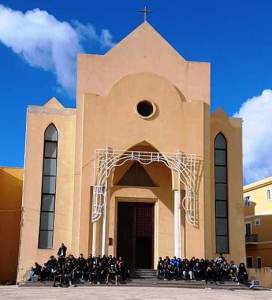They were called the Lampedusans. They are still expecting
by Marta Bellingreri
In May they were being called “the Lampedusans”- the pregnant
women who arrived on Lampedusa and were than transferred to Palermo’s Civico
hospital. There are no longer in hospital as their babies were all born in May
and June, which is the first time we met them. Yet, nonetheless, they are still
‘expecting’. I am not referring to new pregnancies even though the pathways
they must follow are certainly laborious. What these women are now expecting is
a response from the commission to learn whether their request for refugee
status or a permit of stay on humanitarian grounds has been accepted or
rejected.
But the
delivery is even more painful as not all of these women have been reunited with
the fathers of their children. Since they arrived on Lampedusa, since the
birth, there are fathers who have not seen their babies who were born in Italy. Wives
who are breast feeding without the loving caress of a father. Luckily, this is
not the case for Hemi, she has had her husband by her side since June 10th.
They found each other a month after having arrived on Lampedusa. He was
transferred off Lampedusa when his wife was already in hospital. Hemi was very
lucky that her husband was able to join her as she lost her baby. On the 10th
June, the same day in which he was born, she also received news that he had not
made it. On the same day her husband arrived. He did not have the possibility
to see his child. He was only able to accompany him three days later with his
wife to an unknown cemetery in a city where they had only just arrived, Palermo. It will now
always be associated with these tragic events, which provide the couple with
good reason to hate the city and to want to escape. But actually, Hemi and her
husband do not hate Palermo, they return
willingly when they can afford to buy things that they cannot find in Trapani: hair extensions
and accessories from the Nigerian shops in the Sicilian capital. They came to Palermo to meet us again
after 3 months. When I first spoke to them they did not have the money for the
bus fare. How could I pay the tickets for them? It took me a while to
understand, but in fact the solution was much simpler than I had thought:
“You buy the credit, I sell the credit.”
It was
simply a matter of buying a telephone top-up card and sending her the code. She
was then able to sell this number on to someone in the Centre where she was
staying and was able to purchase the bus tickets. For those of you who were
wandering how the migrants might actually get hold of any cash, sometimes just
buying a telephone card is enough. The bus arrived.
The last
time I had seen Hemy, she was full of hope at the prospect of seeing her
husband and was awaiting the arrival of the child which had been conceived in
Lybia. Now she has her husband by her side but little Prince only lived for a
few hours. Heny and her husband were granted just a year of protection by the
commission. “It has been wasted,” said their lawyer. But is a year
really enough or Hemy and her lawyer to find out what caused the death of her
little boy, which the hospital never communicated to her. Hemy goes back to Palermo to try and
understand, but above all, to try and find Prince, who is in a cemetery which
she does not know where it is.
Another of
the women, Bless, gave birth to two children, the famous twins born in Civico. She is staying in the
countryside surrounding Palermo.
The air is fresh and pure, ideal for the babies, but there is no father. They
fall under the care of the Prefecture, which would seem to be even slower than
the commissions, yet Bless has had no personal contact with the Prefecture or
her husband, who is still in Milan.
These are everyday stories or those within the asylum system today in Italy,
who are denied their requests, their families whilst waiting for the Italian
dolce vita.
Joyce is in
Naples. She is
staying in the Garden Hotel. It is close to the central station and has been
used for reception for several months now. It is paid by the Ministry to ‘keep’
Nigerians and Pakistanis. But, aside from the Garden Hotel, they have received
no type of documentation whatsoever to attest to their presence in Italy since
May. Unlike Bless, who has never actually been provided with the possibility of
submitting her request for asylum, the refugees at the Garden Hotel in Naples have met with the
Commission. The event took place two weeks ago and only the husbands were seen.
Obviously the answers have not come through yet. Nonetheless, they say that
those on the commission were kind and listened to each of the migrants. On the
list of dramatic events which between Nigeria
and Lybia brought them to Italy,
all of which were told to the commission, Elas, Joyce’s husband has been unable
to digest everything that has happened. It wasn’t something which happened in
Lybia but it was during the war. Actually, it occurred during two wars: the war
in Lybi and the war against migrants which at the same time takes the lives of
human beings by closing them up in a centre just a few miles from Lybia, on Italy’s most
famous island and on the main route, Lampedusa. Elas told us that he spent a
month and a week on the other side of a gate where he was unable to meet
anyone. During his time spent there he remembers only one name, Daria. Italy
is a waiting country for Elas. During that month if he had to see one of the
centre’s designated doctors, he would have to wait around three hours with no
certainty that the doctor would actually show up. Today he is waiting for his
presence to be recognised on this soil, the first he set foot on after his
escape. How many months will he actually have to wait?
There are
several surprises at the Garden Hotel. I had gone to find Joyce and see Grice, her
daughter who she gave birth to in the Civico
just a few days after I first met her and also meet her husband who, last May,
was still on the island
of Lampedusa. But while I
am there I meet Fayza, a Pakistani girl in the neighbouring room. She had been
in the country for a week and had already given birth. But when she arrived she
felt even more alone than the Nigerian women who were able to hope in their
improvised English/Italian to be able to communicate to some extent. Fayza, however,
whose language is Urdu had far greater problems with communication which was
further exacerbated by the fact that Fayza was in no condition to be smiling at
anyone. Now Fayza forces herself to say some words in Italian is with her
husband, her mother-in-law and her nephew. I discover I have already spoken to
her husband several times on the phone but did not realise that he was related
to this women who could not smile in the Civico
hospital. Fayza’s husband is also Hamza’s uncle. Hamza is a shy sixteen year
old who arrived with them on the 19 May, but who stayed on Lampedusa until mid
July. This delay was incurred merely due to the fact he had requested to be
transferred near to his uncle. He was deprived of his personal freedom for two
months for merely having made a request. His uncle had even registered his own number
as “Lampedusa” but I knew him as Hamza’s uncle. I find out that
Fayza’s mother-in-law also made the crossing with them. She is an elderly
Pakistani lady who perhaps seems the most well-adapted to Neapolitan life of
all of them: maybe this is because she was able to live the majority of her
life in her own country rather than spending it having to wait in this one.
Hemy,
Bless, Joyce, Fayza and Jummy are all women who are expecting. There is the one
who is with her husband but without her child, one who is without her husband
but has her two twins, the one who has not got over the humiliation of an
undeserved detention and one who is surrounded by the family with whom she
arrived. The only one of them whose wait in this foreign country could be
considered in any way sweet.
The names
of the wives and their husbands have been changed.
see original text (Italian)



